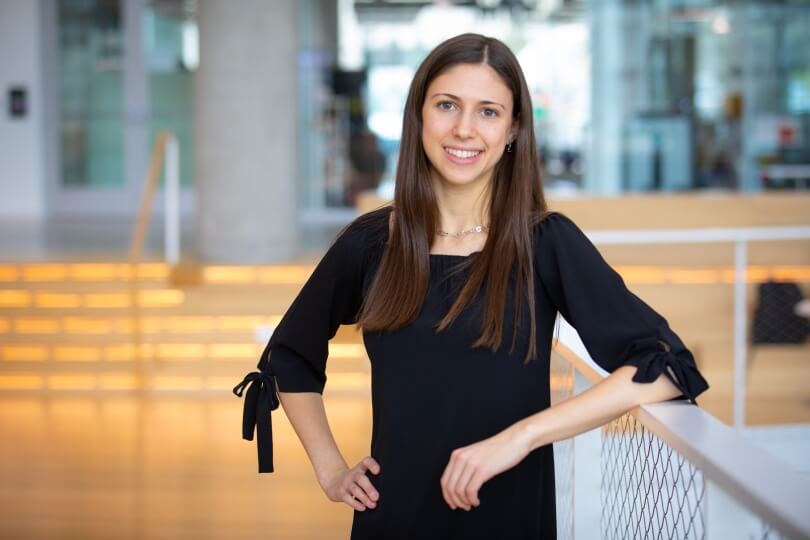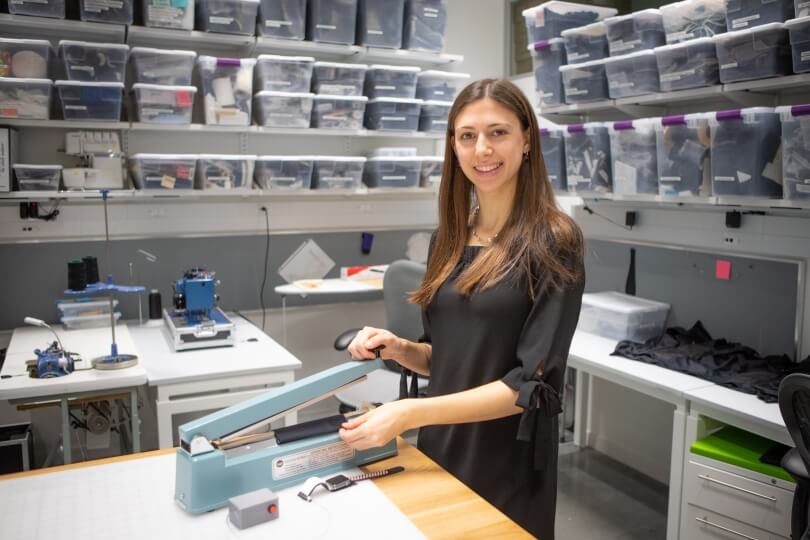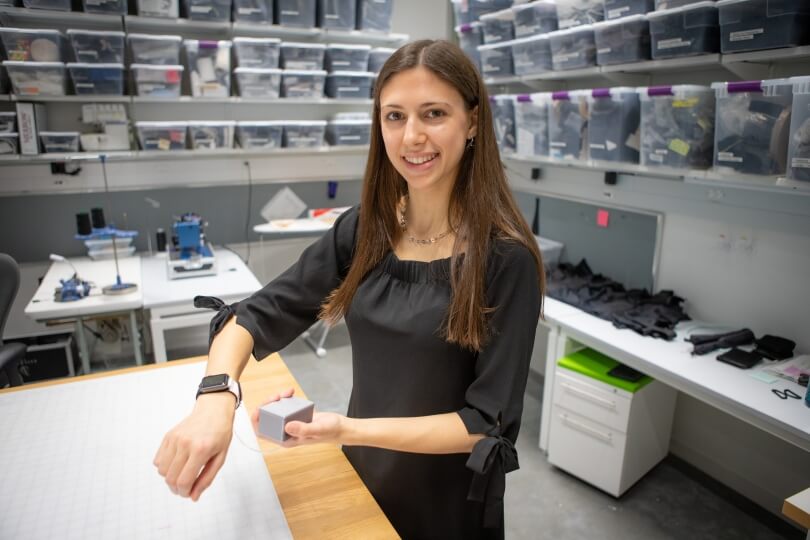Arielle Rothman witnessed first-hand the potential of medical technology while growing up in Long Island, New York. Her sister has type 1 diabetes, and Rothman watched as treatment for the disease became less painful and invasive over time.
Arielle Rothman, S.B. '22 in Engineering Sciences: Bioengineering (Eliza Grinnell/SEAS)
“Initially, my sister had to prick her finger and inject insulin multiple times a day,” Rothman said. “Once continuous glucose monitors and insulin pumps became available, I saw my sister go from struggling with a burdensome disease to becoming a carefree child who could fully enjoy her youth. This transformation was enabled by medical devices, which inspired my passion for developing technologies that improve the lives of patients.”
Rothman has pursued that passion for medical technology throughout her four years studying bioengineering through the engineering sciences SB track at the Harvard John A. Paulson School of Engineering and Applied Sciences (SEAS). As a freshman, she joined the lab of Doug Melton, Xander University Professor of Stem Cell and Regenerative Biology, and contributed to his efforts to cure diabetes using stem cells. The following summer, she joined Professor Ellen Roche, Ph.D. ‘15, at the Therapeutic Technology Design and Development Laboratory at MIT.
While researching mechanical therapy, she and her team discovered a potential avenue for improving muscle healing, and Rothman jumped at the opportunity to translate medical research to patient benefit. That led her to co-found MomMe in 2020, which aimed to use mechanical stimulation to help women recover after giving birth.
Rothman took charge of the product and conducted “market research, which involved speaking to over a hundred patients with a variety of medical conditions and to doctors from many different fields.” Her analysis identified the unmet need of postpartum women who often experience tears during childbirth. Her team designed a wearable device to help improve muscle healing in mothers so they can recover faster.
Senior Arielle Rothman pursued her passion for technology translation through multiple internships and research opportunities throughout her time at SEAS. (Eliza Grinnell/SEAS)
Founding MomMe was just one way even the COVID-19 pandemic couldn’t prevent Rothman from pursuing her passions. She took a gap year to dive into the world of entrepreneurship and medical devices, interning for three different companies ranging in size from five to 40,000 people. The smallest company she worked for was Alife Health, where she led a product management initiative to define the customer need and design an artificial intelligence algorithm to assist with in vitro fertilization.
“It was an incredible experience to work at such an early-stage start-up,” Rothman said. “I was part of a small team defining product features, creating a strategy for FDA approval, designing clinical trials, hiring new teammates, and preparing for a Series A funding round. Because it was such a new start-up, I was able to take part in all aspects of the company and gain insights into the complex process of bringing a medical technology to market.”
Once she understood the early steps of a start-up, Rothman sought out a growth stage startup and joined Cala Health, a 100-person company specializing in wearable devices. Rothman worked as a mechanical engineer and drove the team to redesign key features of the device to streamline the manufacturing process. From the experience, Rothman learned “how to optimize design and manufacturing to deliver thousands of safe and reliable products to patients.”
The third company Rothman worked for was Boston Scientific, one of the largest medical device manufacturers. She was a product management intern for a next-generation product that uses electricity for deep-brain stimulation to treat movement disorders such as Parkinson’s disease.
“Right after the device got FDA approval, I led clinical specialist and physician training sessions, watched surgical implants in the operating room to guarantee proper usage, and ensured a successful launch,” Rothman said.
For her senior capstone project, Arielle Rothman designed and built an Apple Watch band capable of accurately measuring blood pressure. She received a Dean’s Award for Outstanding Engineering Project. (Eliza Grinnell/SEAS)
When Rothman returned to Harvard for her senior year, she began work on her senior capstone project, in which she designed and built an Apple Watch band capable of accurately measuring blood pressure. The project was selected for a Dean’s Award for Outstanding Engineering Projects.
Outside of her coursework and internships, many of Rothman’s extracurricular interests reflect the same focus on entrepreneurship and medical technology. She was director of Innovation Talks for the Harvard College Engineering Society, director of the Harvard-MGH Surgery Interest Group, career development chair for Harvard Society of Women Engineers, and part of the Undergraduate Technology Innovation Fellows program run jointly by SEAS, Harvard Business School and the Harvard Faculty of Arts & Sciences.
Never one to forget who she’s trying to help, she was also president of Harvard Buddies, a student group that visits and tutors children undergoing cancer treatment at Massachusetts General Hospital.
“One of my most meaningful memories from volunteering with Buddies was tutoring a child with a brain tumor who came to Boston for treatment from Ohio. The highlight of my week was meeting with this bright, enthusiastic child and bringing some normalcy to a family in an unfamiliar and frightening situation,” she said. “While labs and device companies have the ability to impact thousands of people, I really appreciate how Buddies enabled me to connect with individual patients and immediately see the significant impact I could have.”
Making a positive impact through medical technology has been at the heart of every choice Rothman made in her four years at Harvard. Those years have provided so many opportunities and experiences for her to draw on, whatever turns her career takes.
Press Contact
Matt Goisman | mgoisman@g.harvard.edu


